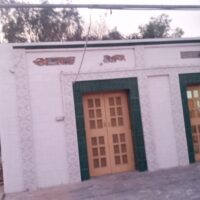Lahore, Nankana; 2020-2021: Anti-Ahmadi activists got a police case registered against three Ahmadis under anti-Ahmadi clauses PPC 298-B and 298-C in P.S. Mangtanwala District Nankana Sahib on May 2, 2020. A lot of water has passed under the bridge since, and now these charges stand hugely upgraded with additional clauses PPCs 295-C and 295-B for which the penalties are ‘Death’ and ‘Life Imprisonment’ respectively.
One of the accused, Mr. Akbar Ali has already died in prison, while awaiting release on bail.
The Honorable Mr. Justice Farooq Haider of Lahore High Court recently endorsed the verdict forbidding Ahmadis:
- To have any association with Kalima Tayyaba, the Islamic Creed
- To recite the Holy Quran or even have its copy
- To keep books of their own holy founder in possession, otherwise face charges under the blasphemy sections PPC 295-C and/or PPC 295-B.
This ominous decision has far-reaching implications for all Ahmadis in Pakistan and their Human Rights in general and Freedom of Faith in particular. It could open yet another floodgate of tyranny.
As such, a brief resume¢ and summary of this case is called for. It is placed below for information and record.
These three Ahmadi accused, Messrs. Sharafat Ahmad, Akbar Ali and Tahir Naqqash were arrested on October 3, 2020 when their plea for bail was rejected even at the High Court level. Mr. Akbar Ali died thereafter on February 16, 2021. Seven days thereafter, a Lahore High Court judge mercifully granted bail to the remaining two accused.
Initially the police case was registered as the complainant allegedly essentially found:
- Islamic creed written in the Ahmadiyya mosque
- Copy of the Holy Quran was found there
- A volume containing the spoken words of the Ahmadiyya Founder was also recovered from there.
Anti-Ahmadi activists were not happy that the accused were charged only under the anti-Ahmadiyya sections. They applied to Magistrate Adil Riaz to add the more (and most) grave blasphemy clauses PPC 295-C and PPC 295-B. The magistrate granted the request on January 4, 2021.
Along with the issue of upgradation of the charges was the plea for the confirmation of bail after arrest. Both the magistrate and the Additional Sessions Judge (ASJ) Suhail Anjum rejected their plea for confirmation. However, as stated above, the High Court granted the bail after the death of Mr. Akbar Ali, one of the accused.
The case of upgradation of charges was first decided by the magistrate; then Additional Session Judge Abu Bakar Siddique heard the appeal against that. Thereafter the accused took their plea to the august high court in Lahore where Justice Farooq Haider heard their plea and rejected it, upholding the ASJ’s decision and his reasoning. Justice Haider added little to the ASJ’s verdict and simply endorsed it expressing his satisfaction with sessions’ reasoning and conclusions.
Here we quote a few extracts from the Magistrate’s decision and the ASJ’s verdict, inter alia, that are mentioned in the Order Sheet of the Lahore High Court in this Case No. Crl. Misc. No. 31929-M of 2021, Tahir Naqqash and another VS The State etc., issued by Justice Farooq Haider. Magistrate Adil Riaz chose to lean heavily on two specific decisions, one of the Supreme Court 1993 SCMR 1787 (a majority verdict) and High Court PLD 1992 Lahore I, to support his decision. He quoted and wrote (extracts):
“…..The reason is that when an Ahmadi or Ahmadis display in public on a placard, A badge or a poster or write on walls or ceremonial gates or buntings, the Kalima’, or chant other ‘Sahee’re Islam”(sic) it would amount to publicly defiling the name of Holy Prophet (P.B.U.H) and also other prophets, and exalting the name of Mirza Sahib, thus infuriating and instigating the Muslims to that there may be a serious cause for disturbance of the public peace, order may be serious cause for result in loss of life and property…”
The use of Kalima Tayyiba by the Non-Muslim’s Ahmadi’s falls within the ambit of 295-C PPC (PLD 1987 Lahore, 458). (sic)
In the light of judgment PLD 1992 Lahore 1, the Hon’ble Court laid down in paragraph No. 35 that 35…. “In view of the specific claim of Mirza Ghulam Ahmad, it is apparent that belief of Ahmadis is that Mirza Sahib is Prophet Muhammad and souse of the words (محمد رسول اللہ) in the banners or the badges worn by an Ahmadi would be at his own peril as it amounts to defiling the scared name of Holy Prophet (P.B.U.H.) and such acts certainly fall within the purview of section 295-C, PPC.
That according to recovery memo, copies of the Holy Quran has been recovered from the Unholy place of occurrence under the administration of accused persons who are declared infidels which tantamount the conduct of the accused persons that is in derogatory manner and for unlawful purpose and fall within the ambit of 295-B PPC Defiling of Holy Quran.
…
It is pertinent to mention here that in many verses of Holy Quran the name of Holy Prophet (محمد رسول اللہ) is mentioned thereof the recitation of Holy Quran by Qadianis falls within the ambit of 295-C PPC.
According to PLD 1991 10 and PLD 2014 FSC 18 the name of other Holy Prophets defiles fall within the ambit of 295-C PPC.
The Book “Malfozat JILD 2 of Qadianies is also recovered in which they defiles the sacred name of Allah, the Holy Prophet Sallallahu Alihi Wasallam, the other Holy Prophets, the Holy Quran and the other Holy books on page No’s 1, 65, 99, 200, 217, 278, 422, 437, 477, 488, 489, 504 etc. and such acts certainly fall within the purview of section 295-B and 295-C, of PPC.
Charges once framed would not become right or irrecoverable; it can be altered or changed u/s 227 Cr.P.C, if it is so warranted by the circumstances.
From bare perusal of the contents of the instant FIR and other material available on record the offences under section 295-B and 295-C PPC apparently are made out and after perusing the contents of the FIR and in the light of law laid down and the judgments of the Hon’ble Superior Courts it is crystal clear that the sacred name of the Holy Prophet (Sallallahu alihi wasallam) was derogated and the Holy Quran was defiled by the accused person, hence this application.
Defiling the name of Holy Prophet (Sallallahu alihi wasallam) by illegal usage of ShairEIslam Kalma Tayyiba fall within the purview of section 295-C, PPC.
In view of what has been discussed above, the court has arrived at an irresistible conclusion that offence u/s 295B/C PPC are bound to be added along with 298-B & C PPC as the accused have prima facie committed offence of (توہینِ قرآن) and (توہینِ رسالت) S.A.W. With these observations the application filed by the complainant duly forwarded and supported by the prosecution seeking addition of charges stands accepted……..”(Sic)
Justice Farooq Haider similarly quoted ASJ Siddique from his order dated May 3, 2021 (extracts):
At the very outset this Court observes that the petitioners during the investigation never negated this fact that they belong to ‘Ahmadi’ group. Though Constitution of Islamic Republic of Pakistan envisages freedom of religion but ‘Ahmadis’ and ‘Qadianies’ have different background who cannot be equated with Christians and Jews. Without dilating further upon their religion suffice it to say that our Constitution has declared the ‘Qadianies’ as non-Muslim. After having comparative analysis of other religions with Islam it can easily be inferred that followers of no other religion claim themselves to be Muslims but in case of ‘Qadianies’ they consider themselves Muslims and rest as non Muslims. Element of deception and misrepresentation in case of ‘Qadianis’ is much stronger and it is this factor which demands more caution to take initiatives to forestall ‘Qadianis’ from using ‘Shaair-e-Islam and Shaair Ullah’ which are specific to Muslims. If a Qadiani reads Kalima Tayyiba it will not only outrage religious feelings of a Muslim but it will defile and desecrate the name of Holy Prophet (P.B.U.H.) as in such a case ‘Mirza Ghulam Ahmad Qadiani’ is referred to as the prophet. This court observes that Kalima Tayyiba is the founding stone of religion of Islam and basic identity of a Muslim. A ‘Qadiani’ can by no way be allowed to use Kalima Tayyiba.
In the instant case, it is abundantly clear that the petitioners inscribed Kalima Tayyiba in their place of worship to which they regarded as ‘Masjid’ which act itself constitutes an independent offence u/s 298-C PPC. Record also divulges that copies of Holy Quran were recovered from the place of worship of the petitioners. In many verses of Holy Quran the name of Holy Prophet (P.B.U.H.) is found mentioned as on umpteen occasions Allah Almighty addressed Holy Prophet (P.B.U.H.) by his name. If a ‘Qadiani’ reads Holy Quran he will read it with the apparent belief that the word of Muhammad (P.B.U.H.) found mentioned in the Holy Quran was (Naooz Billah) used for “Mirza Ghulam Muhammad Qadiani”(sic). Reading the Holy Quran with the conviction is itself desecration and defiling of Holy Quran.
This court observes that quantum of damage which is being caused by ‘Ahmadies’ and Qadianies’ to the religion of Islam is unconceivable because a naïve Muslim is simply unable to comprehend the sinister designs of ‘Ahmadies’ and ‘Qadianies’. The vile web of conspiracy woven by ‘Ahmadis’ is extremely treacherous and intriguing and it is clarion call of the time that all such measures should be taken by the State which will pre-empt the ‘Ahmadies’ and ‘Qadianies’ in implementing their nefarious designs.
In the instant case during the course of investigation, the book in the name and style of ‘Malfuzaat-e-Bazbaan’ Jild 2 was also recovered. A cursory glance of this book is enough to outrage the religious feelings of a Muslim because it expressly defiles and desecrates the name of Allah Almighty. Holy Prophet (P.B.U.H.) other Prophets, the Holy Quran and other Holy books which clearly constitutes the acts which fall within the four corners of section 295-B, 295-C PPC.
… This contention of the learned counsel for the petitioners that the complainant and other prosecution witnesses entered into their place of worship without any authority does not hold water as the petitioners has referred their place of worship as “Masjid”. Masjid/mosque is considered as a public charity. It appears that upon having an ingress into such place it dawned upon the complainant and other prosecution witnesses that how the petitioners were desecrating and defiling the Holy Quran, Kalima Tayyiba and other Shaair-e-Islam in utter disregard of Constitution of Islamic Republic of Pakistan and the Law of the Land.”(Sic)
Ahmadis have gone to the Supreme Court to seek relief in support of their constitutional human rights and freedom of faith against this decision of Justice Farooq Haider of LHC that depends almost entirely on reasoning of a magistrate, who called Ahmadiyya mosque an Unholy place, and an ASJ who considers the damage done to Islam by Ahmadis ‘unconceivable’. Here one is reminded of a 172-page verdict of Justice Shaukat Siddique (now retired) of Islamabad High Court in which he promoted inter alia the idea of Ahmadis to wear clothings of a particular colour and to be forced to add the words Mirzai or Ghulam Mirzai as surname to their names. However, all said and done, higher judiciary is the last hope of fairness in this Land of the Pure. On numerous occasions in the past, the superior judiciary and even judges below have refused to act like mullas and provided relief and justice to the persecuted.
Here, we hold back our comments on Justice Farooq Haider’s Order Sheet in this case, and leave it to the Honorable Supreme Court to give a verdict. As for ‘Banning Religious Scriptures’, a readable and relevant 2-page article is placed at Annex I.



